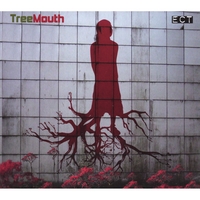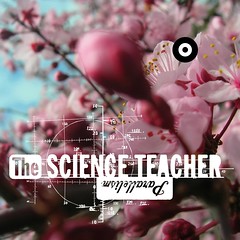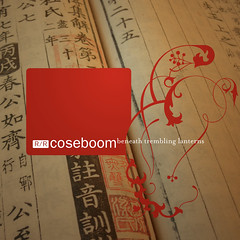
Artist: Sankt Otten
Album: Eine Kleine Traurigkeit
Year: 2008 (first issue: 2000, on Eleganz Records)
Rating: 5/5
I admit that Sankt Otten's albums never amazed me on my first listen. I admit that, by definition, I have strong negative opinions regarding pop music and I do admit that I have a strong bias towards the so-called 'trip-hop' movement, which was never considered clearly underground (classical?) or clearly pop. I've been into this sound (it's not a genre, but a sound) for about 4 years and I still haven't grown out of it. I've collected a lot of trip-hop records over the years and I have discovered numerous hidden gems, but, until recently, Sankt Otten were nowhere near my favourite bands.
Thanks to the likes of Colour Kane and Glassacre, I've eventually found out about the myriad of talented bands around this Australian label called Hidden Shoal Recordings, so it was a matter of time until hearing of Sankt Otten... I often think that I was drunk or something while listening to their albums the first time, as I never managed to retain much from that first audition. It took some time for me to fully appreciate "Wir koennen ja freunde bleiben" and "Wunden gibt es immer wieder". However, right from the second listen, "Eine Kleine Traurigkeit" blown me away. Considering the fact that German vocals don't particularly appeal to me and that "Eine Kleine Traurigkeit" isn't too innovative either (the innovations here are subtle), this might seem pure magic.
Let me tell you what I think: these guys are poets. They can effortlessly place a jigsaw into the right place. They can make us see that things make sense. They always win with their heart instead of a dictionary. Their heart is a dictionary! What they're doing here looks like cartography to me, as their songs have a rare way of precisely expressing things, feelings that seem somehow
more real than the reality. Because, each time you play this album, you can feel the night surrounding you, and that's the best and most precise thing I can say about "Eine Kleine Traurigkeit". It's a journey to the center of the night, a disturbing and exciting trip to Miss Terria's Darkness Factory...
When this album was first released, back in 2000, there still was anxiety floating in the air, due to the arrival of the new millennium... In 2008, long after trip-hop lived its heyday, Hidden Shoal reissues this little known album. Whether it is 9/11 or the Iraq War or the Large Hadron Collider, there's always a reason to be nervous, uncertain. The sour times that were so often depited in trip-hop songs are not only here, but you can also feel they're aggravating. In 2000 Sankt Otten already felt the need for "post trip-hop", the need for expanding beyond the already established trip-hop sounds and experiment with the posibilities of this, ahem, genre (which doesn't mean they can't perfect the old "formula", a thing they did on tracks like "Elektronik Nein", besides more courageous tracks like "Stille Tage im Klischee"). The most obvious result of this need can be heard in the single "Tiefgang", a piece that seems to be derived from western spaghetti soundtracks a la Ennio Morricone rather than Blue Lines. The two different styles might seem to clash, but, being so cinematic, the Sankt Otten sound can easily merge the two apparently contrary directions. The experimenting is still a bit subtle on this album, only on the following albums the band has moved towards more courageous territories. Nevertheless, "Eine Kleine Traurigkeit" is a (pretty inspired, I'd say) step in the right direction, which is maybe the only reason why it could be considered a predecessor of Portishead's "Third", as here there are no experimental rock pretentions or downright hopeless sounds like in "Third".
It is pointless to talk about songs. "Eine Kleine Traurigkeit" is a whole. Rarely I've seen albums that are albums and not just collections of singles, like in most pop music. Like in more elevated styles of music such as classical or like in some proggresive rock, everything fits in (and it isn't an coincidence that the (initially) last track on the album, "Ende Gut", is an elegiac song performed only on piano and vocals). Each song is like a jigsaw that fits in perfectly, and not even the bonus track from this 2008 reissue, "Stille Tage im Klischee" (which, by the way, translates roughly as "Quiet Days in the Cliché"), strays too far from this. And it is also pointless to talk about the lyrics. To be honest, I don't know German well, but somehow I can understand everything very well. That's the beauty of music: it makes you realize. The vocals aren't just part of the soundscape, it is a facet of the soundscape. Thanks to the likes of Sigur Rós, we listeners (or at least some of us) haven't forgot that music is a language that transcends languages.
I could tell you more about how the androgynous vocals fit in the concept or how this is much better than average pop music or how my grandma likes Portishead or whatever, but, frankly, I hate to do this. I only want to say this: try this album (by the way, you can try and hear the full songs on sites like Last.fm so why not?), buy this album, eat this album, drink this album, fork this album, sleep by this album, etc. etc. Don't see it as a critic's opinion. See it as the recommendation of a friend who likes music like you do. I'm an enthusiast who has listened to lots of music (not just trip-hop), not a critic that was professionally trained to tell you in 100 pages how this is the next "Dark Side of the Moon"... I just like music and don't want you to miss this essential releases, definitely one of the best CD's I've heard this year. Don't ignore it (I've done that way too many times with this and other albums), because it deserves your attention and you might actually find it rewarding.
Thank you for having the patience to read this.
P.S. And my grandma doesn't listen to Portishead, actually, she doesn't listen to anything in particular...
(20 December 2008/22:17)






